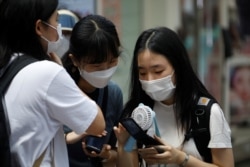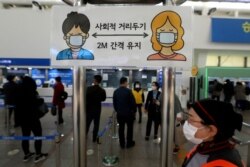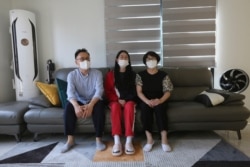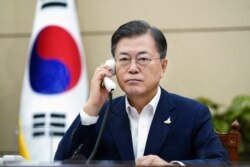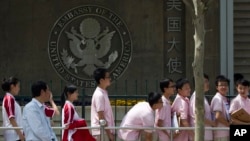Student Union
South Korea to Hold College Entrance Test Amid Pandemic 'Third Wave'
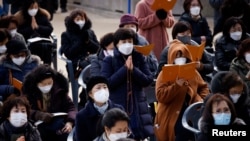
As nearly a half-million South Korean students prepare to take an all-important college entrance examination later this week, health and education officials are stepping up efforts to prevent test sites from becoming coronavirus hotspots.
On Thursday, much of South Korea will quiet down as students in their third and final year of high school complete a test that is widely seen as having an oversized impact on one’s academic, professional and even marital prospects. Officials say that roughly 490,000 people have applied for this year’s one and only College Scholastic Ability Test (CSAT), better known in Korean as the suneung.
Like on nearly every previous test day, airplane flight patterns will be diverted away from some 1,300 testing locations nationwide, the country’s stock market will open late and all nearby construction will come to a grinding halt in hopes of eliminating potential distractions. But, unlike in any other year, all students will be wearing masks, plexiglas barriers will be installed between desks and anyone presenting possible COVID-19 symptoms will be quarantined at an alternate testing center.
For most students, who’ve spent much of their academic careers studying for the suneung, the exam day was already a high-stakes challenge. And now in the midst of a pandemic that has disrupted the school year and their attempts to prepare for the exam, the test has become even more anxiety-provoking.
“I was breathless while taking my practice test with a mask on,” said 18-year-old Shin Min-seon, who hopes to score well enough to get into one of South Korea’s top universities and study media. “We’re nervous, we’re going to suffocate while taking the suneung and our scores are going to be affected this year because we have to wear masks.”
South Korean officials are trying to thread the needle between administering the CSAT and protecting the health of test-takers while not causing these students to panic over all the anti-virus precautions.
Health authorities already say the country is in the midst of a “third wave” of coronavirus infections and have elevated social distancing measures, including restricting operating hours and dining policies at restaurants and coffee shops.
On Wednesday, the Korea Centers for Disease Control and Prevention recorded 511 new COVID-19 cases, a relatively high number for the country, which has won praise from around the globe for its contact tracing and testing methods, but continues to face sporadic cluster outbreaks.
The CSAT was originally scheduled for mid-November, but because the academic year was postponed by several weeks at the start of the pandemic and classes were temporarily moved online, officials pushed back the date to December 3.
The Ministry of Education has opened 86 remote test facilities for students who are currently in isolation or who show signs of COVID-19 infection. Leading up to this week, officials urged the test-takers to refrain from attending after-school tutoring academies, spending time in online game parlors or meeting with friends in tightly packed karaoke studios.
Inside exam centers, students are being asked to avoid mingling during breaks and to wear warm clothes since windows will be left open for ventilation.
High school underclassmen, who usually gather in the early hours of the morning outside exam sites to cheer on the seniors, have been discouraged from congregating on Thursday and parents of suneung-takers have also been asked to not wait for their children at those locations, according to guidance issued by the government.
In the United States, college entrance test dates for the SAT and ACT have been canceled or rescheduled multiple times this year. But, in South Korea, there was never concern that the suneung would be officially called off.
Because of the importance ascribed to the test as well as the money that many Korean families spend on tutoring for their children, Seoul “had no option” but to allow the test to move forward, said Andrew Eungi Kim, a professor in the Division of International Studies at Korea University.
“If there was an attempt to cancel the test, there would be a demonstration not by the students, but by their mothers,” he said.
In 2019, South Korean families spent $19 billion on private education for their grade school students, according to Statistics Korea.
Kim says in South Korea, when a student earns a university degree, it “carries much more weight” than in many other countries. A high CSAT test result is the entry point into a prestigious school, which leads to promotions in leading conglomerates and in turn increases one’s marriageability, he explains.
Kim says CSAT-takers from affluent families most likely will not be too affected due to this year’s academic complications, but not so for those who come from households that can’t afford the extra-curricular cramming or virtual learning.
“The pandemic has disrupted public education and has effected the middle and lower class much more,” he says.
On the eve of the suneung, test-takers received an apology of sorts from President Moon Jae-in for all the complications during this year’s exam.
“It's hard to prepare for the CSAT itself, and it will be even more difficult and worrisome to take the exam in the coronavirus situation,” he wrote on his social media accounts, which was translated into English by the Yonhap News Agency.
"I feel sorry [as the president]. I'd like to put warm scarves around your necks.”
Juhyun Lee contributed to this report.
See all News Updates of the Day
- By VOA News
International students discuss US campus culture shock

International students at De Anza College in Cupertino, California, talked about culture shock in an article in La Voz News, the student newspaper.
"It felt like a major culture shock. Everything was so different, from academics to mannerism," said a student from Mexico.
Read the full story here.
These are the most expensive schools in the US
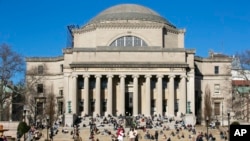
High tuition costs along with housing and food expenses can add up for students at U.S. colleges and universities.
MSNBC looked at the most expensive schools in the country, with one costing more than $500,000 for a bachelor’s degree. (June 2024)
Uzbekistan students admitted into top US universities
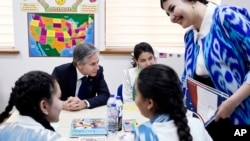
Students from Uzbekistan are among the international students admitted to top colleges and universities in recent years.
Gazata.uz profiled some of the Uzbekistan students attending Harvard, Brown, Princeton and other U.S. universities. (June 2024)
- By Stella Hsu
Reports of visa checks, deportations worry Chinese STEM students in US
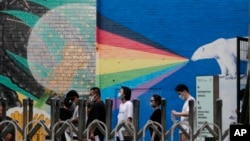
Geopolitical tensions and growing competition in tech between the United States and China appear to be spilling over into academia despite commitments from the world’s two biggest economies to boost people-to-people exchanges.
The United States remains the top choice for Chinese students seeking to study abroad with nearly 300,000 studying in American colleges and universities during the 2022-2023 school year. But reports of some cases that students and professors are facing extra scrutiny while passing through immigration and the deportation of others are raising concerns.
For Chen Xiaojin, a doctoral student studying semiconductor materials at a university in the Washington, D.C., metropolitan area, it has been six years since she returned to her hometown of Beijing.
At first, it was the COVID-19 pandemic that kept her from going home. But over the past two years, she has been deterred by accounts of Chinese students majoring in science and engineering being required to reapply for their visas upon returning to China.
She also says she is worried by reports over the past six months of Chinese students being deported, even at nearby Dulles Airport.
"My current research is relatively sensitive, and my boss [adviser] is getting funds from the U.S. Department of Defense, making it even more sensitive,” she told VOA. "I am afraid that I won't be able to return after I go back [to China]."
Chen says that if she did return to China, she would have to apply for a new visa.
In a report late last month, Bloomberg said it had found at least 20 Chinese students and scholars with valid visas who were deported at U.S. Customs since November and barred from reentry. The U.S. Customs and Border Protection Agency does not release relevant data.
Immigration attorney Dan Berger represented one Chinese student who was deported late last year. He tells VOA Mandarin that the student studied biological sciences at Yale University and was about to complete her doctorate.
She visited her family in China and got a new visa but was deported by customs at Dulles Airport and barred from reentering the country for five years. Berger said he did not see anything suspicious in the transcript of the conversation between the student and the customs officer.
"We have seen what seems like a pattern over the last six months of Chinese PhD students being turned around…. more than I've seen in quite a while," he said.
Matthew Brazil, a fellow at the Jamestown Foundation, said neither country seems willing to explain the situation. However, he believes that in most cases, the United States must have valid reasons for blocking visa holders from entering the country.
In some cases, the student’s background may not match what is written on the visa application. In other cases, customs agents may also find something that the State Department missed, and once they see it, they are responsible for taking action.
"I wish the Chinese side would be specific about their students who were refused entry,” he said. “The fact that both sides are mum on details and that the Chinese side is engaged with the usual angry rhetoric means that each has security concerns. And that says to me that there was good reason for the U.S. to stop these particular applicants."
Brazil also sees a connection between the entry denials and export control regulations issued by the United States in October 2022 that restrict China's ability to obtain advanced computing chips, develop and maintain supercomputers, and manufacture advanced semiconductors.
U.S. Customs and Border Protection is one of the law enforcement agencies authorized to investigate violations of export control regulations, he said.
"Beijing's intelligence agencies are known to focus attention on PRC [People's Republic of China] students and scientists headed abroad who study or work on dual-use technologies controlled under the Export Administration Act — compelling Chinese students and scientists to report on what they've learned when they return to China on holiday,” he said. “This has been true for decades."
Bill Drexel, a fellow for the Technology and National Security Program at the Center for a New American Security, said the U.S. government did find some cases where students tried to steal strategic technology for China.
"I think it would both not be surprising that they found some really questionable or incriminating evidence for some students,” he said. “It would also not be surprising if, in their hunt for really solid evidence, they also may have made some mistakes on other students.”
Drexel adds that “it’s just kind of an unfortunate fact of the time that we live in and the tactics that the CCP uses when it comes to these measures."
In a post on X in early May, U.S. ambassador to China Nicholas Burns tried to dispel concerns about visas and entry to the United States for students and scholars. In the post, he said "99.9% of Chinese students holding visas encounter no issues upon entering the United States.”
In an interview with The Wall Street Journal Monday, Burns said it is China that is making it impossible to promote people-to-people ties. Burns told the Journal that students attending events sponsored by the United States in China have been interrogated and intimidated.
He also said that since U.S. President Joe Biden and China’s leader Xi Jinping held their summit in San Francisco last year, China’s Ministry of State Security and other agencies had interfered with Chinese citizens’ participation at some 61 events.
At a regular briefing on Wednesday, Chinese Foreign Ministry spokesperson Mao Ning dismissed those accusations, saying that they did not “reflect reality" and that went against key understandings reached by both countries’ presidents in San Francisco.
“The United States, under the pretext of 'national security,' unjustifiably harasses, interrogates, and deports Chinese students in the U.S., causing them significant harm and creating a severe chilling effect,” Mao said. “The image of the United States in the minds of the Chinese people fundamentally depends on the actions of the United States itself.”
Drexel said he believes Burns’ comments about visas and students' willingness to study in the U.S. still ring true.
“On balance, it's still the case that American universities are overwhelmingly warm towards Chinese students and want them in large numbers," he said.
However, Berger, the immigration lawyer, is concerned about the chilling effect recent cases involving Chinese students could have.
"In general, we are being more careful about advising Chinese graduate students in STEM fields about traveling and letting them know that there is some small risk,” he said.
Even though the risk is small, it does seem to be real at the moment, he said.
Adrianna Zhang contributed to this report.
US federal judge blocks new regulation targeting for-profit colleges
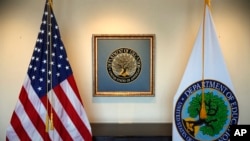
A federal judge in Texas has blocked a regulatory provision targeting for-profit colleges that was scheduled to take effect in July 2024.
Times Higher Education reports that the rule, which would affect student loans, was challenged by for-profit institutions. (June 2024)




